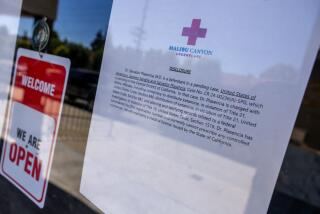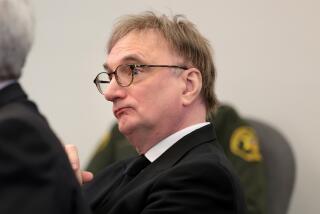Doctor Describes Aiding Cancer Patient’s Suicide : Ethics: Many authorities support physician. But he could face charges of second-degree manslaughter.
- Share via
A Rochester, N.Y., physician who helped a dying patient commit suicide and wrote about his involvement says that he went public with the case to stimulate open discussion among physicians and the public about ways to ease the suffering of dying patients.
In a telephone interview, Dr. Timothy E. Quill said he has received many calls of support since his essay appeared in Thursday’s New England Journal of Medicine. The article already has sparked widespread debate.
But while most authorities view Quill’s decision to assist his patient as sincere, and even support it, he could face charges of second-degree manslaughter. According to the Monroe County (N.Y.) district attorney, an investigation of the case has been opened, but no decision has been made on whether to file charges. Quill, however, said lawyers advised him that his risk of being sued or prosecuted is minimal.
In a detailed and poignant memoir published Thursday in the New England Journal of Medicine, Quill, a primary care internist at The Genesee Hospital in Rochester, told how he helped a longtime patient die.
The patient, a 45-year-old woman identified only as Diane, had a severe form of leukemia that is curable with aggressive treatment only 25% of the time. Rather than submit to painful treatments that might not work, Diane decided to forgo therapy and eventually sought Quill’s help in dying when her illness became too much to endure.
At first, Quill wrote of her request: “I . . . thought it was out of the realm of currently accepted medical practice and that it was more than I could offer or promise.”
But after numerous discussions and medical evaluations, he told her she could obtain information from the Hemlock Society, a pro-euthanasia organization based in Oregon. Diane eventually asked Quill to prescribe barbiturates to help her sleep.
“I made sure that she knew how to use the barbiturates for sleep, and also that she knew the amount needed to commit suicide,” he wrote.
With only a few weeks to live, according to Quill’s estimation, Diane took her life after saying goodby to her friends, family and the doctor.
Quill, a former hospice program director, said Thursday that he made the difficult decision to write about the case because he felt his profession and the public could benefit from a discussion of his actions. He received Diane’s family’s permission to write about the case.
“I guess I weighed several things,” said Quill, 41, a balding, soft-spoken man. “One was my belief that the public, and most of the medical profession, was ready for a serious discussion of this issue.
“I think we’ve inadequately addressed the dying of suffering people. And the cases that have been publicized so far have been so unusual and so superficial that they haven’t allowed it to be dealt with.”
In 1988, an anonymous essay titled “It’s Over, Debbie” in the Journal of the American Medical Assn. initiated a public debate over the role of a physician when a terminally ill patient wishes to die. In that case, a doctor on call gave a lethal injection of morphine to a dying cancer patient he did not know.
In a more recent case, Dr. Jack Kevorkian of Michigan helped a Seattle woman in the early stages of Alzheimer’s disease to die by connecting her to a “suicide machine.” When the patient, Janet Adkins, pressed a button, the machine delivered a lethal dose of drugs.
The Quill case is much different, ethicists and medical professionals said Thursday.
“We were pleased to see this man have the courage to say this,” said Derek Humphry, founder of the Hemlock Society. “He looks like a mainstream doctor. Kevorkian, although we agreed with what he did, was such a far-out man. He wasn’t a good example.”
Quill displayed “considerate, careful, justifiable” behavior while his patient came across as lucid, resolved and supported by her family, Humphry said.
“This case is the archetypal best sort of case,” he said.
The Hemlock Society advocates euthanasia, including physician-assisted suicide, for terminal patients, which is illegal in the United States. Quill’s actions did not constitute physician-assisted suicide, said George Annas, director of the law, medicine and ethics program at Boston University School of Medicine.
“No laws anywhere in the United States prohibit doing what this doctor did,” he said. “What would have been illegal is if he would have been there and actively assisted in the death itself. Here, he is involved, but very remotely. He, all the time, counseled her and tried to get her into treatment. But he refused to abandon her. He supported her in an informed, competent decision.”
But, according to Howard Relin, district attorney for Monroe County, Quill’s actions might violate the law.
“The potential charges could be manslaughter in the second degree, which is a felony if you intentionally assist another person in the commission of suicide,” Relin said. He said the investigation is expected to take at least a month.
Annas said he believes the public would be outraged if Quill were prosecuted.
“The vast majority of Americans would say ‘I’d like this guy to be my doctor,’ ” he said. “No one is going to think this is horrible.”
While sympathetic to Quill, his actions do not fall within the standards of practice suggested by the American Medical Assn., says Dr. John Ring, president-elect of the AMA.
“I have reservations about supplying a patient with medication and instructions as to what the lethal dose is,” he said. “I think the AMA is pretty clear that for a physician to assist a patient to commit suicide is not ethical. We certainly sympathize with Dr. Quill and, more so, the patient. This is a terrible, terrible dilemma.”
Quill said he is “not particularly interested in becoming a symbol for a movement,” but added that he had always supported efforts to ease the suffering of dying patients. Until Diane’s case, however, he had not thoroughly explored his own feelings on euthanasia.
“This definitely raised my own consciousness,” he said. “Prior to this, it was an abstract issue. But when someone like Diane, who I’d known for a long time, came up with a request that was so articulate, I had to consider it.”
Quill said he hopes the article will prompt discussion among the public as well as medical and legal experts.
“I think the most important people who need to be heard from are patients,” he said. “Do they think this kind of option should be available? I think we should find out if that’s what they want. For the profession, the question is how do we respond to these people who are dying?”
Quill said he has received many calls of support from colleagues.
“So far the feedback has been extremely positive, both from patients and my colleagues. I think many patients and doctors have gone through struggles like this. There is not that much that is particularly unique about this case.”
More to Read
Sign up for Essential California
The most important California stories and recommendations in your inbox every morning.
You may occasionally receive promotional content from the Los Angeles Times.










